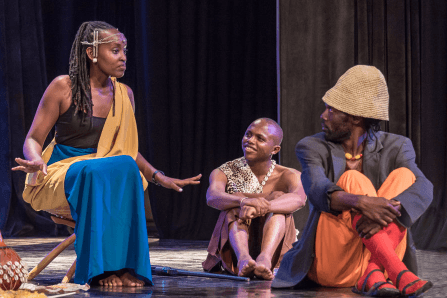The Jalada collective: Charting Africa’s linguistic multiverse
More about the book!

Aaron Bady has written an article for Pacific Standard about Jalada Africa, a pan-African literary collective with a radical mission: ‘an ongoing translation effort to unite – and elevate – African literature’.
Jalada’s “about” page is brief and to the point: a “pan-Africanist writers’ collective” whose goal is “to publish literature by African authors regularly by making it as easy as possible for any member to publish anything.” This tautology – their goal is to publish the things they are publishing – tells a story of its own: Jalada is just the work itself, without money, pretensions, or ego. The anthologies don’t have introductions, nor are there mission statements or manifestos; there is only the writing.
In the article, Bady outlines Jalada’s plans to explore the thousands of mother tongues that Africans speak, including a project to translate stories from European to African languages and between African languages.
On Twitter, Bady provided some more background to the story and shared some of the conversations that didn’t make it into the final article because of space constraints:
Yesterday, my profile of Jalada, a pan-Africanist collective in Kenya (and not in Kenya) went live: https://t.co/ds5haxXqVs
— Aaron Bady (@zunguzungu) May 17, 2017
I interviewed over a dozen people for that piece, and because of space constraints, I couldn't include SO MUCH of it. OMG SO MUCH.
— Aaron Bady (@zunguzungu) May 17, 2017
So I'm going to share a few fragments and stories that were shared with me. For example, @TendaiHuchu on problems he had with translation: pic.twitter.com/A7qh0mmYHt
— Aaron Bady (@zunguzungu) May 17, 2017
@TendaiHuchu 2. Here's Peter Ngila, talking about translating into Kikamba: pic.twitter.com/0MZPl0qlwJ
— Aaron Bady (@zunguzungu) May 17, 2017
A LOT of the people I talked to about their translations would end up talking about their grandparents.
— Aaron Bady (@zunguzungu) May 17, 2017
I had a great conversation with @louiseumutoni about the different *eras* of Kinyarwanda she had to choose from in her translation.
— Aaron Bady (@zunguzungu) May 17, 2017
For so many of these (usually first-time translators), the languages they were using were located in particular people, places, times.
— Aaron Bady (@zunguzungu) May 17, 2017
(This is one of @Keguro_'s constant refrains about Ngugi: that "mother tongues" are not there to be recovered, but have to be reconstructed)
— Aaron Bady (@zunguzungu) May 17, 2017
And sometimes the language isn't there to be recovered. I had such a great conversation with Saaleha Idrees Bamjee about her failure to…
— Aaron Bady (@zunguzungu) May 17, 2017
…translate the story, because her "kitchen Gujarati" simply wasn't adequate to it; too many words in the story had no equivalent.
— Aaron Bady (@zunguzungu) May 17, 2017
I think she said her grandmother's word for "revolution" would have been something like "commotion," as in "what's this blasted commotion"
— Aaron Bady (@zunguzungu) May 17, 2017
I don't think I was able to really capture this in my piece, but every one of these translations was like peeking into a new world.
— Aaron Bady (@zunguzungu) May 17, 2017
And it really underscores the vastness of the problem, and the ambition of the project to chart that African linguistic multiverse.
— Aaron Bady (@zunguzungu) May 17, 2017
And it really underscores the vastness of the problem, and the ambition of the project to chart that African linguistic multiverse.
— Aaron Bady (@zunguzungu) May 17, 2017
At the start, @MosesKilolo gave me a bunch of leads, for example; I didn't get to follow this one up: pic.twitter.com/NM3ZQqalEZ
— Aaron Bady (@zunguzungu) May 17, 2017
Over and over again, every story (abut translating a single story) immediately opened up a whole entire world.
— Aaron Bady (@zunguzungu) May 17, 2017
Eriata Oribhabor, talking about translating the story into Naija Languej, the version of Pidgin that he and others are trying to mainstream pic.twitter.com/i9ME66RVZL
— Aaron Bady (@zunguzungu) May 17, 2017
Here, you can see the work of reconstruction that is (still) required to write in a language that everyone knows. pic.twitter.com/fwStogFR5J
— Aaron Bady (@zunguzungu) May 17, 2017
One of the really special things about this project was that almost all the translators were essentially doing it for the first time.
— Aaron Bady (@zunguzungu) May 17, 2017
And were mostly working in languages where there weren't a lot of models to follow and build on. They had to build so much from scratch.
— Aaron Bady (@zunguzungu) May 17, 2017
For many of these "small" languages, what translation there is tends to be a one-way stream, into English.
— Aaron Bady (@zunguzungu) May 17, 2017
So to translate into those languages–to translate a story INTO Kikamba–is to row against the current. Which is the point of the project.
— Aaron Bady (@zunguzungu) May 17, 2017
Anyway, it's been such a pleasure to get to know these writers, and I've been so grateful to their generosity in sharing their stories.
— Aaron Bady (@zunguzungu) May 17, 2017
Watch them. They're going places.https://t.co/xEDiPNxWbV
— Aaron Bady (@zunguzungu) May 17, 2017
This is a video from two years ago, but you get a good sense of the sort of energy behind the project. https://t.co/HHYaZccZ9v
— Aaron Bady (@zunguzungu) May 17, 2017
Of course the trouble with writing about Jalada is that by the time you file a story, they've started a new project: https://t.co/ZxSixAQH05
— Aaron Bady (@zunguzungu) May 17, 2017
And now, off to go sell books. Salute, @JaladaAfrica!
— Aaron Bady (@zunguzungu) May 17, 2017
Categories Africa Fiction International
Tags Aaron Bady Jalada Jalada Africa Pacific Standard Translation
